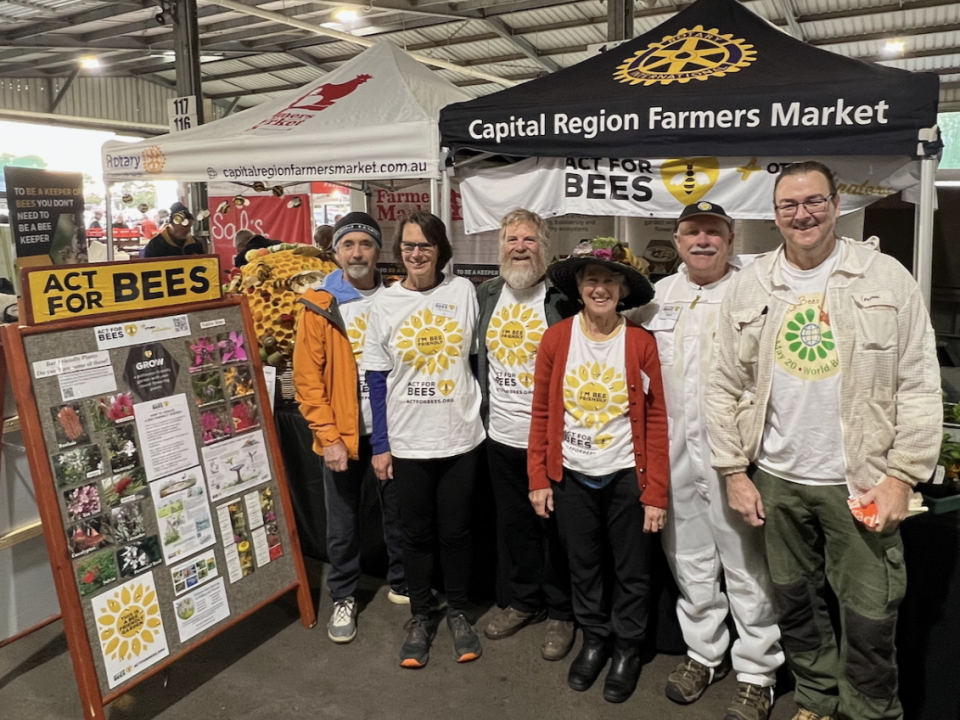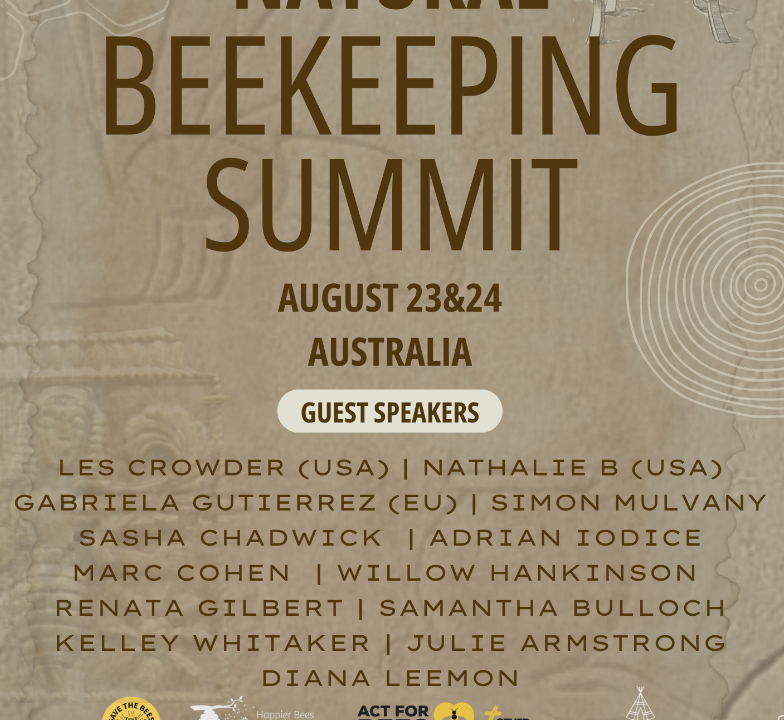Spring Bees Buzz
October 29, 2018World Bee Day celebrations Saturday and Sunday 18th /19th May
May 1, 2019 Spring and summer activities
Spring and summer activities
Its been sometime since you’ve heard news from us, but we’ve been very busy networking and making progress with a number of projects towards “Bee Friendly Canberra’
In early Spring, 10 of us from Australia headed to a very special conference Learning from the Bees, where we met with over 300 people from 30 countries with a focus on the wellbeing of bees. We heard from Natural Beekeepers & bee scientists, community pollinator planting initiatives, artists & educators who are bringing renewed connection to the bees, the earth and for peace. More on this further down the page.
Canberra Region Beekeepers Field Day Saturday March 9th
 The Canberra Natural Beekeeping group has really gained momentum upon return, thanks to Warren and Jon’s focus. Regular practical activities include building of Warre hives & a Cathedral hive and also learning how to build the beautiful straw Sun hives which the Natural Beekeeping Trust has pioneered.
The Canberra Natural Beekeeping group has really gained momentum upon return, thanks to Warren and Jon’s focus. Regular practical activities include building of Warre hives & a Cathedral hive and also learning how to build the beautiful straw Sun hives which the Natural Beekeeping Trust has pioneered.
You will see a range of hives at the ACT Region Beekeepers Field Day is on Saturday March 9th 10-4pm Dairy Flat Rd, Fyshwick including native bee hives. Come along to this major field day event for 2019. The day includes demonstrations of beekeeping (both native and honeybees) as well as honey sales and beekeeping gear vendors. Great food and ACT for Bees will be there with children’s activities and information about ways to get involved in Bee Friendly Canberra (and delicious bee forage plants for your garden) Go to Gardening for Bees for more info on how to make your garden/ school/ business bee friendly.
ANU for Bees
ANU for Bees is buzzing with 111 new members who joined last week working to promote a ‘Bee Friendly’ campus which supports the health of pollinators by planting a wide range of plants for forage, reducing pesticide usage, and raising general awareness about biodiversity and pollinators in the Australian National University (ANU) community. Their first task was to plant up around the Canberra Environment Centre with a wide range of native plants for flowering throughout the year. Fantastic initiative thanks to Rob, Meg, Josh and Julia who have been active members of ACT for Bees. They are following the initiative from Bee campus USA, which is part of Bee City USA and overseen by XERCES, a very large organisation for the protection of pollinators. World Bee Day may also have a planting for pollinators project involving Strathnairn Art Precinct, Ginninderry and ANU for Bees.
If you’re at ANU and interested in joining the group, please contact anuforbees@gmail.com.
Pollinator corridors are happening everywhere
 ACT for Bees has been collaborating with the Ginninderry development in West Belconnen on creating pollinator corridors within the landscape, to support the health of pollinators and biodiversity. We’ve just received the great news that the area around The Link building, Ginninderry’s Community and Information Centre, will be planted with a very diverse range of plants for pollinators and include Indigenous gardens and plants native to the Belconnen region. The native ‘Air Bee n Bee’ residents will be very happy to have gourmet food readily available throughout the year. Thank you Ginninderry for taking up the initiative towards being part of Bee Friendly Canberra (Bees, Butterflies, Birds, Biodiversity!)
ACT for Bees has been collaborating with the Ginninderry development in West Belconnen on creating pollinator corridors within the landscape, to support the health of pollinators and biodiversity. We’ve just received the great news that the area around The Link building, Ginninderry’s Community and Information Centre, will be planted with a very diverse range of plants for pollinators and include Indigenous gardens and plants native to the Belconnen region. The native ‘Air Bee n Bee’ residents will be very happy to have gourmet food readily available throughout the year. Thank you Ginninderry for taking up the initiative towards being part of Bee Friendly Canberra (Bees, Butterflies, Birds, Biodiversity!)
Other Australian local pollinator initiatives
- SEE Change Acton Birdscaping and Pollinator project. October 2018
- Agrifutures Australia establishing pollinator corridors on farms and estates
- Landcare
- Greening Australia
- Pollinator Link
- In addition to pollinator corridor initiatives, other corporate entities including Bunnings (removing neonicotinoid pesticides from sale and plants) and IKEA (hives at Canberra store) are leading the way in how corporations can become Bee Friendly to support the broader ecosystem.
More on Learning from the Bees conference

Bee Scientists presented their work on treatment free beekeeping, conservationists shared their research on wild hives and activists and environmental lawyers involved in policy change at the governmental level spoke of their work. A range of pollinator corridor initiatives displayed their inspiring community projects as well as those involved in education with children shared their approach to beekeeping with children and curriculums. Artists displayed their beautiful work to engage us all in deepening our connection to the bees and their plight. A series of interviews by Jan Michael’s – Women in Beekeeping can be viewed on the Learning from the Bees website. It was a truly coming together of many voices and diverse ways we are all engaging with ‘bee awareness’ and strong networks have been forged worldwide. There was also a presentation on how Sunhives are turning lives around in HM Rye Hill prison in the UK.
 Planting for pollinator initiatives were very popular, especially amongst young people, and have been a wonderful way to bring nature connection and landscape restoration into the social sphere. From this, we truly believe that these initiatives are beginning to spread globally and will be included in both government and private initiatives.
Planting for pollinator initiatives were very popular, especially amongst young people, and have been a wonderful way to bring nature connection and landscape restoration into the social sphere. From this, we truly believe that these initiatives are beginning to spread globally and will be included in both government and private initiatives.
- Bee Foundation , Netherlands; creating bee oases, AIM: 10,000 ha in 10 years.
- Honey Highway: developing initiatives with government and non government organisations to establish pollinator corridors along roadsides, railways and dykes.
- Blooming Landscapes. Germany
- Hines Property Management San Francisco USA
- Bee Friendly Monmouthshire Wales UK
The link between all of these projects was the drive to establish projects that combine social and environmental ideals by engaging the community.
At the conference we heard stories from Israel from Yossi who initiated “Bees for peace” in order to join hearts and create cooperation between Christians, Muslims and Jews, Palestinians, Israelis and Jordanians. The initiative helps build bridges through the bio-dynamic bee keeping methods in multiple constellations – amongst kids in schools, through courses and activities for adults coming from different sectors and cultures and in diverse backgrounds.
It was a very inspiring and unforgettable conference which has created a world network of love and hope for the bees, the earth and humanity. We are very grateful to the Natural Beekeeping Trust, BEEtime and SMART Beeing for organising this event.
Be a bee guardian.
The crises we are facing on all levels of the environment and society need deep transformation and these positive changes are happening around the world. We can all tune into the positive stories where we find our true humanity and compassion. Amplify the good by sharing these stories. Let us all make time to go outside and look out for the bees, and breathe in and appreciate the beauty all the gifts that nature so readily shares with us. Plant flowers for the bees and enjoy watching the landscape revitalise.
For educators or those wishing to understand more about the bees, ‘Love Food? Love Bees! curriculums are a source of wonder, connection, understanding and ways to take action. The Love Food? Love Bees! Food Security and Sustainable Agriculture showcases farmers who have shifted to farming methods that support the health of water, soil, biodiversity and all of our health too. Buying local, organically grown food is a very practical way for us all to drive the change that is needed.



